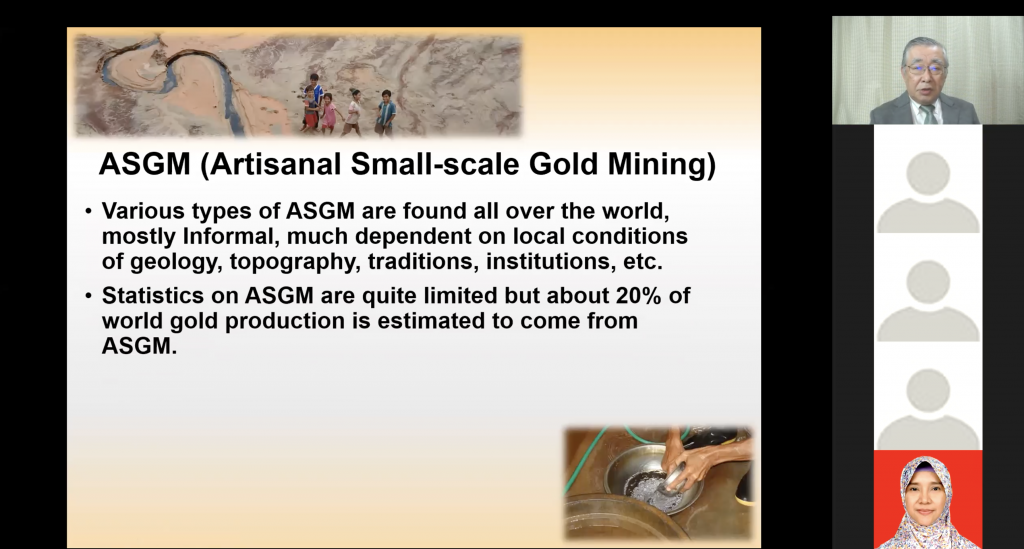Updated Information
Updated on January 25, 2021
4th Japan – ASEAN Medical Seminar on Human Health Impact of Heavy Metals held
The 4th Japan-ASEAN Medical Seminar entitled “United Nations Environmental Program (UNEP) and Minamata Convention on Mercury” was held as an online Zoom Webinar for the lecture entitled “Minamata Disease to Minamata Convention” by Professor Motoyuki Suzuki, Chairman of the Board of Directors, Japan Association for the United Nations Environment Program at 16:00 – 17:05 (Japan Standard Time (JST)) on Monday, January 25th, 2021.
The seminar was organized by SRIREP Project, Research Institute for Humanity and Nature (RIHN), Japan and supported by the Japan Society for the Promotion of Science (JSPS).
First and foremost, Professor Masayuki Sakakibara, Project Leader of SRIREP Project, Research Institute for Humanity and Nature (RIHN), explained Research Institute for Humanity and Nature (RIHN) SRIREP Project. After that, Professor Motoyuki Suzuki, Chairman of the Board of Directors, Japan Association for the United Nations Environment Programme presented the lecture entitled Minamata Disease to Minamata Convention including the topics: 1) Environmental pollutions related to economic developments in Asia, 2) Environmental experiences in Japan, 3) Four majors pollution events, 4) Minamata disease, 5) Industrial uses of mercury, Global mercury events timelines, 6) The historical backgrounds of the use of mercury in Japan including its impact and intoxication, 7) Artisanal and Small-Scale Gold Mining (ASGM), and 8) Minamata convention, etc.
In this seminar, Mr. Myo Han Htun, Research Associate of SRIREP Project, RIHN acted as a moderator and dr. Sri Manovita Pateda, Ph.D., Lecturer/ Medical Researcher Medical Department State University of Gorontalo and dr. Win Thiri Kyaw, Ph.D. Medical Researcher SRIREP Project, RIHN acted as translators for English to Indonesian and English to Myanmar respectively for the audiences of Indonesia and Myanmar.
And then, Professor Motoyuki Suzuki answered the questions of the audiences during Q and A section. During the discussion, attendees asked several interesting questions including how to solve the problems by the impact of mercury and alternative methods of using mercury in ASGM. Regarding the mercury pollution by ASGM activity, Professor Motoyuki Suzuki and Sakakibara M. discussed (1) the need of making reasonable equipment to recover the mercury vapor emitted during burning amalgam into liquid mercury and reuse this for ASGM to prevent the atmospheric pollution of mercury, also, (2) using the alternative method such as gravity panning method, (3) recommend to wear the masks containing charcoal or activated carbon while using mercury in ASGM, and (4) not to release mercury to water bodies for preventing mercury contamination to fish and shellfish.
This 4thJapan – ASEAN Medical Seminar is one of our remarkable events of SRIREP Project’s as 929 persons registered but due to the limited number of online webinar systems, only 500 attendees could concurrently access for their participation. Moreover, 540 persons – 56% from Indonesia (304 persons), 40% from Myanmar (216 persons), 3% from Japan (17 persons), and Others (3 persons) attended the seminar. The attendees are government staff, researchers, lecturers and students of universities, media related persons, journalists, engineers, and medical doctors from various public and private organizations from Indonesia, Japan, Myanmar, and Thailand including Universities, Institutes, Governmental Organizations, NGOs, NPOs such as Public Health Department, Medical Department, Department of Traditional Medicine, Department of Marine Science, Environmental Conservation Department (ECD), Food and Drug Administration (FDA), Network Activities Group (NAG), We Women Foundation, etc. attended the seminar.
In addition, the number of attendees who joined the seminar for over 50 minutes is 288 persons (53% of the total attendees) according to the report of Zoom Webinar’s statistic information.

Previous Information

